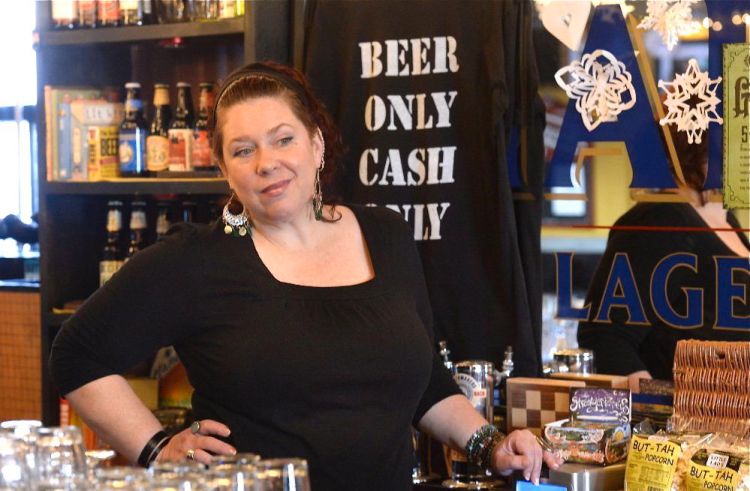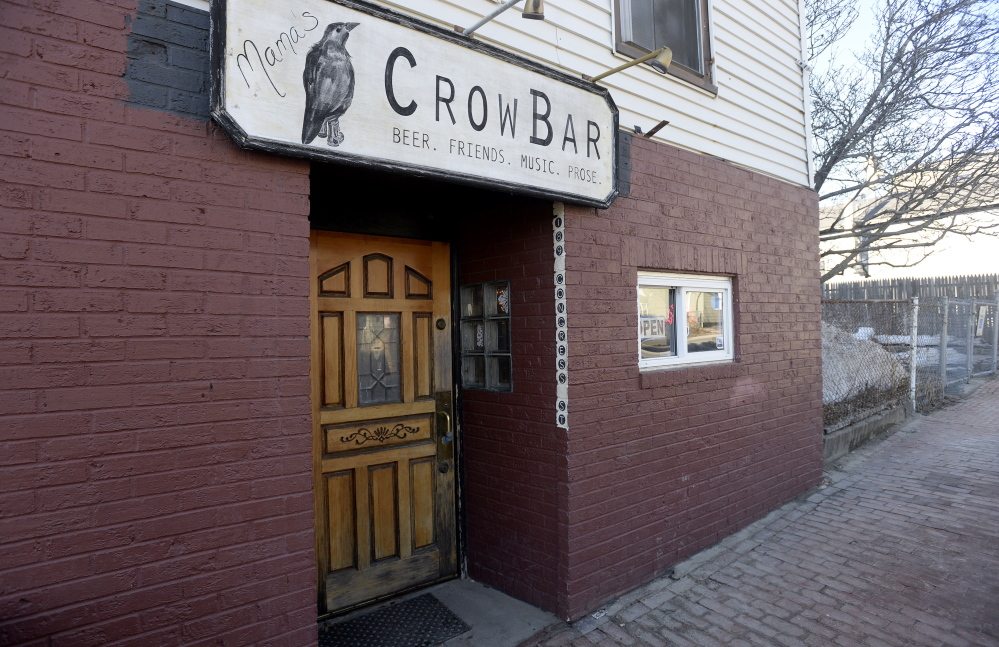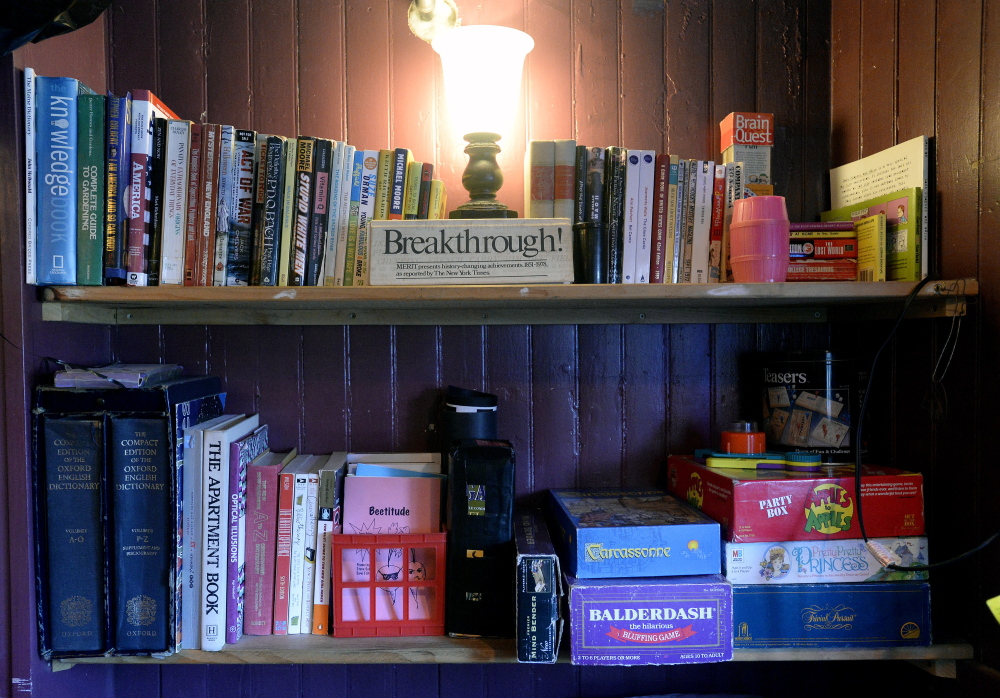There’s no wall of hard liquor behind the bar at Mama’s CrowBar, just a black T-shirt with the words “Beer Only, Cash Only” and beside it, a chalkboard listing the day’s specialty microbrews.
Top shelf refers to a row of books, including a seriously outdated one on interior design, puzzles and some worn boxes containing games. Paper snowflakes hang from the tin ceiling.
Another chalkboard lists dozens of names followed by dollar amounts. It’s not their bar tab, but something called Karmic Beers, where friends buy a drink for someone who’s not there but may be in later, when they can collect.
“When you come in and see your name there, it’s a nice surprise,” said James Jameson, a regular who says it was the first bar he visited in Portland and remains his favorite. “A lot of it is just the feel. You can be yourself so long as yourself isn’t an ass.”
But when its lease runs out in October, if not sooner, the CrowBar will close its doors, signaling an end to a quirky institution, one of the things that fans say gives Munjoy Hill its cool.
“It’s a dive bar with heart,” said Rep. Diane Russell, D-Portland, a frequent visitor who represents the East End and used to live across the street. “CNN interviewed me at the bar. I’ve fallen in love at that bar. I’ve had my heart broken at that bar.”
FIGHTING SUDDEN EVICTION NOTICE
The CrowBar’s eclectic decor, its unusual mix of entertainment – much of it customer-generated – and even its esoteric beer list make more sense after meeting its owner, Trisha Pryce Henley.
Known not just as the bar’s matron, Henley also is a major figure on the local poetry scene. She has helped elevate involvement in live poetry reading and has been especially influential in getting women poets to read publicly. Next week she leaves for Albuquerque, New Mexico, to compete in a national poetry competition, Women of the World Poetry Slam, March 18-21.
There, she will read poems about pain and fighting and perseverance, drawn from her own life experiences, not the least of which has been the battle to keep her bar open.
“We’re talking about a woman who has struggled her entire life,” Russell said. “She made something magical and beautiful for the people of Munjoy Hill. All she wants to do is get through the end of her lease.”
Henley finds herself locked in a legal battle with the building’s owners, who she says are trying to evict her. This week she received an eviction notice saying she failed to pay the March rent. Her attorney, John McVeigh, said the owners failed to come and collect the rent check as they have each month over the past two years.
“Why they’ve decided to try this end run when all they have to do is wait six months and they’ll be done with it anyway, I can’t explain,” McVeigh said.
The current building owner, listed on city tax records as Shane Dobson, could not be reached Wednesday. The telephone number listed with directory assistance was disconnected and a message left with another number associated with the address in city records was not returned.
A telephone message left for the owners’ attorney, David Turesky, was not returned Thursday.
A PLACE TO HANG OUT WITH FRIENDS
Henley, who has run the bar there since 2009, says the building owners tried to evict her in 2013, claiming she didn’t have a lease. A judge agreed that her arrangement with the bar’s previous owner was binding for another three years, she said. It was an important victory, but it only preserved the status quo and she still owes legal fees from the case.
Behind the nondescript door and single, sliding window on the facade of 189 Congress St. is a simple bar with a dozen stools, a jukebox and a 1932 Wurlitzer piano that doubles as a table for four. When Henley installed a new cooler a year ago, she had to remove the bar to get it in.
“If there’s more than 25 people, you can barely move,” she said.
The bar sits on the first floor of a narrow, three-story building that sold in 2013 for $377,000, according to city records. The top two floors are apartments.
A small, family operation – her son and daughter also tend bar – Henley says she never saw it as a ticket to get rich.
“I think of it as a place for my friends. I think everyone thinks of it as a place full of their friends,” she said.
It was a place that for years offered weekly poetry readings, and still hosts visiting poets that stay in Henley’s apartment while in town. There is bluegrass night, and piano night, and jam night, the one time the bar is open to entire families.
“On Sundays, from 4 p.m. to 6 p.m., you’ll see a couple toddlers and elementary school kids playing Pretty, Pretty Princess or Parcheesi while their parents are playing music or just hanging out,” she said.
Erin Hennessey, another customer, said one of her favorite events was “conspiracy night,” an open mic forum for people to share conspiracy theories.
ONCE BAR CLOSES, A FOCUS ON POETRY
Henley said a bar has stood on the spot at 189 Congress since before Prohibition. Awful Annie’s preceded the CrowBar, and “it was George’s Tavern for 57 years,” she said. “I’m a fisherman’s kid. I grew up in bars. The stories I would hear about George’s reminded me of the bars I would go to on Sunday afternoons for family day.”
Henley said she also wanted to have a bar with a conscience. Nobody is allowed to be visibly intoxicated and guys are not allowed to hit on women.
“I never wanted the bar to be the answer to the question ‘Where’s daddy?’ ” she said.
Russell said the loss of the CrowBar will sting, especially since another neighborhood institution, Sangillo’s, recently was closed by the city because it generated an abundance of police calls. Mama’s CrowBar, police say, has not been a significant source of complaints.
Henley says she’s fighting to keep her bar open as long as she can.
“I grew up ashamed of my family. All I have is my character, and when I’m done, I want my children to be proud of me,” she said, wiping tears from the corner of her eyes.
Once the bar closes, she plans to focus on poetry.
“What I love is not performance or getting on stage, it’s someone getting on stage to tell their story and watching the audience and seeing it resonate with people,” Henley said. She likened it to a church service when the minister’s sermon seems personally relevant.
“I truly believe poetry has the power to save lives,” she said.
Send questions/comments to the editors.




